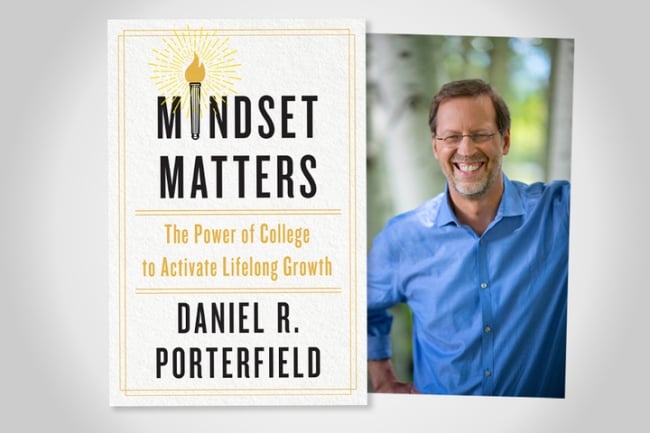You have /5 articles left.
Sign up for a free account or log in.

Johns Hopkins University Press | Daniel Bayer
In his new book, Mindset Matters: The Power of College to Activate Lifelong Growth (Johns Hopkins University Press), Daniel Porterfield, president and CEO of the Aspen Institute, as well as a former president of Franklin & Marshall College, argues that higher ed institutions should strive for a new goal: pushing students to develop a growth mindset.
The term, popularized by psychologist Carol Dweck in a 2006 book, Mindset: The New Psychology of Success, refers to a person’s belief in their own ability to grow and improve their skills and intelligence. By contrast, people with a fixed mindset believe intelligence and abilities are static and cannot be changed. Porterfield, who also served as a faculty member and senior vice president for strategic development at Georgetown University, argues that imbuing students with growth mindsets—the ability to see themselves as lifelong learners, capable of adapting to new circumstances and environments—is especially important in the 21st century, as new technology creates an ever-changing career landscape for graduates.
The book draws on interviews with Franklin & Marshall students about what elements of their college career led them to success, emphasizing stories of flexibility and perseverance in the face of challenges, to explore the core questions: How do universities cultivate these skills? When, where and how in students’ college experience do they learn to learn?
In an interview with Inside Higher Ed, Porterfield discussed the book and how his ideas about students’ mindsets reflect ongoing questions about the purpose of college. The conversation has been edited for length and clarity.
Q: What made this concept of developing a growth mindset stick out to you as an underrecognized goal of higher education?
A: Two factors led me to identify the development of growth mindsets as a key benefit of a strong college education. One was that I was a very hands-on professor who also lived on campus in faculty housing at Georgetown University, and then I was very student-focused president at Franklin & Marshall College. And from the testimonies of my students and mentees over the years, I saw that, again and again, students or young graduates described key learning moments that gave them new confidence in their ability to drive their own future development. That was one of the great takeaways of a valuable college education—that they learned how to learn, they learned they were good at learning, they learned they love learning.
The second was that, like many, I’ve been reading all the articles and observing for myself the rapidly escalating pace of change in our society because of technology, demographics, new communications, connections that allow people to be in dialogue with people that, in previous eras, they never would have been able to talk with. And I just realized that the changing nature of the economy, in particular, required agility and confidence in being able to keep learning and keep growing.
Q: This seems to go against the narrative that college is about developing either critical thinking skills or career skills. What are your thoughts on that dichotomy?
A: To me, the kind of education that focuses on critical thinking and the kind of education that focuses on workplace readiness are actually complementary: two sides of one coin for promoting a growth mindset. Because in order to hold a growth mindset, the student needs to have actually learned or grown; second, has to know they’ve learned or grown; third, has to know how to learn or grow in the future; and fourth, ideally, sees themselves as a learner and a grower. Those four steps towards acquiring a growth mindset can be facilitated through vocational learning, through liberal arts learning, through workplace experience in two-year colleges and four-year colleges and graduate schools and volunteer activity.
Q: What makes college a particularly good place for developing a growth mindset?
A: Growth mindsets can be ignited in many different contexts. What makes the residential college distinctive is the 24-7 environment of learning, day and night. Second, the plethora of faculty mentors available to work directly with students. Third is a constant team atmosphere, where students, all day long, are on different teams: at work, in class, in their activities, in the residential community. Fourth, the residential college setting as a youth setting full of 18- to 23-year-olds who are excited about new ideas. They’re creating their own inventions, they’re connecting with one another, they’re learning and evolving. So, it’s a very dynamic, rich environment with students from all walks of life.
The key factor, though, with all that, is that the individual student needs to take responsibility for her or his learning.
Q: In recent years, there’s increasingly been a narrative of students not caring, being argumentative with their professors, cheating with AI or whatever it happens to be—behaviors that don’t necessarily align with an eagerness to learn and challenge themselves. Do you believe this narrative is accurate, and how does that play into the goal of promoting the development of a growth mindset?
A: In the book, I interview about 30 to 35 students about what it was that made their college experience transformational and how do they move to believing that they could lead their learning for their entire lives. In every case, there was an engaged professor or another university educator who took the time, through what I’ll call a “pedagogy of involvement,” to get to know a student and to hear that student’s sense of hope and aspiration for why they were in college, and then to nourish it and feed it by challenging them and by introducing them to methods by which they could develop their own learning, whether it’s research methods or play-writing methods or critical reading and thinking methods.
That engagement of involved and caring adults with aspirational students is the magic where great learning happens.
Most faculty that I know are so dedicated to their students that they will, as they get to know them, use any means they can have to help them learn and grow. I write about some faculty at Franklin & Marshall who mentored students in research techniques. Others helped them learn how to research the background for a historical drama play that one wrote. Still others helped students think about the dynamics of sameness and difference in the classroom and feel that they, though underrepresented numerically in terms of their background, really belonged in the class and in the school. Again and again, I saw the presence of caring and involved adults as the X factor that allowed students to tap in to what’s great in them to make college count.
Q: In your interviews, students focused more on their “learning journeys” versus the end results of their college educations. What does this tell you about student success and what should colleges take away from this?
A: The value of thinking about the learning journeys is that we can then improve the journeys. We can then say, “Where weren’t students learning? What didn’t go right? How do we facilitate more learning?” There was a period of time when educators said, “A great school recruits terrific students then gets out of their way.” I think that’s an empty pedagogy. I think we should get in the way of students by helping those students to be able to craft their education learning journey and then pursue it.
So, one thing that colleges can do differently, or even better, is maybe think about an alternative transcript to the one we have now, which just describes the courses you’ve taken and the grades you’ve achieved, and instead, build another kind of transcript, perhaps complimentary, where the students are perpetually assessing, “What am I learning now? And what do I want to learn next?” It’s like the transcript becomes a portfolio of goals for learning, efforts to achieve that learning and then insights about what came as a result of that learning.
A second thing I think colleges can do to facilitate growth mindsets is to spend more time early in the college experience, helping students see and feel that they are responsible for their education and that they can take the wheel and make the choices they want to make. And if they don’t pursue their education assertively, that’s on them. Part of their responsibility is to give their best.
Q: Right now, colleges are trying to figure out what it means to give someone an education, not knowing if the world they’re going into is still going to have that job in five years. How can a growth mindset help address this problem?
A: We have to prepare students for a dynamic world where the nature of work and citizenship will change rapidly, because that is a fact. It’s happening. AI is one manifestation, but there’s a plethora of good and bad information coming at citizens all the time, and we also have to prepare young people to be able to separate good information from bad, the wheat from the chaff, so they can actually trust the information sources that they have.
So, I think that the role of higher education is even stronger today, not weaker, because of technological change. The college experience gives us a four-year shot at helping students become independent, self-driven learners, confident consumers of information and more effective at working with and partnering with one another. Those are all key attributes of all jobs for the future. Can you learn? Can you work with others? Can you separate good from bad information? College has a big role to play in facilitating that.
I also think that we want to encourage innovation and creativity, whether it’s creating new businesses, new uses of information gleaned from the large data sets that we now have access to, new ability to pursue research with much more information at our disposal. The way I would think of it is that the information revolution, which now is leading to the artificial intelligence revolution, makes college that much more important for preparing people who will do advanced research, who will lead businesses, who will serve as diplomats, who will be leaders in society, and we want them not to fear change but to be able to manage change.








